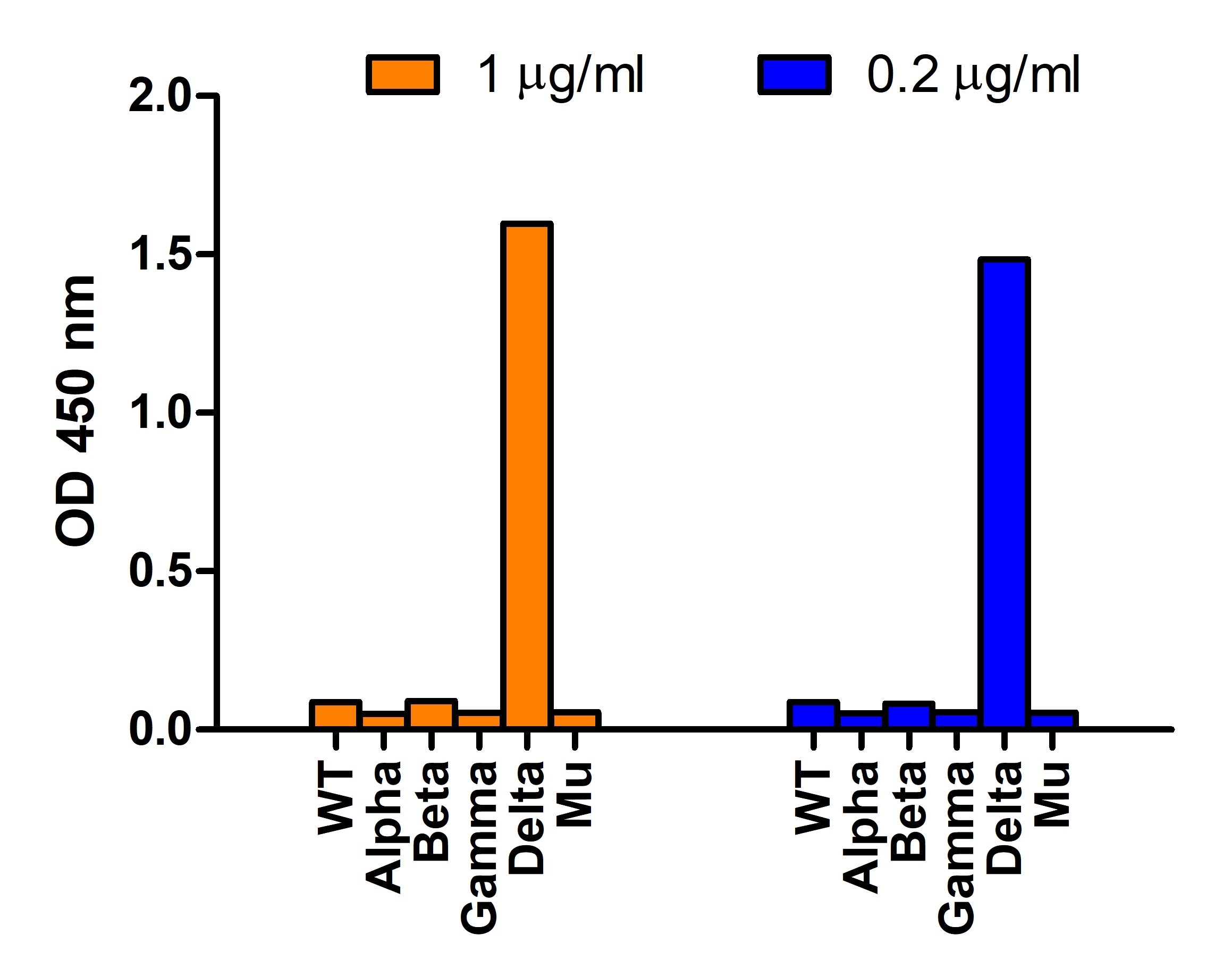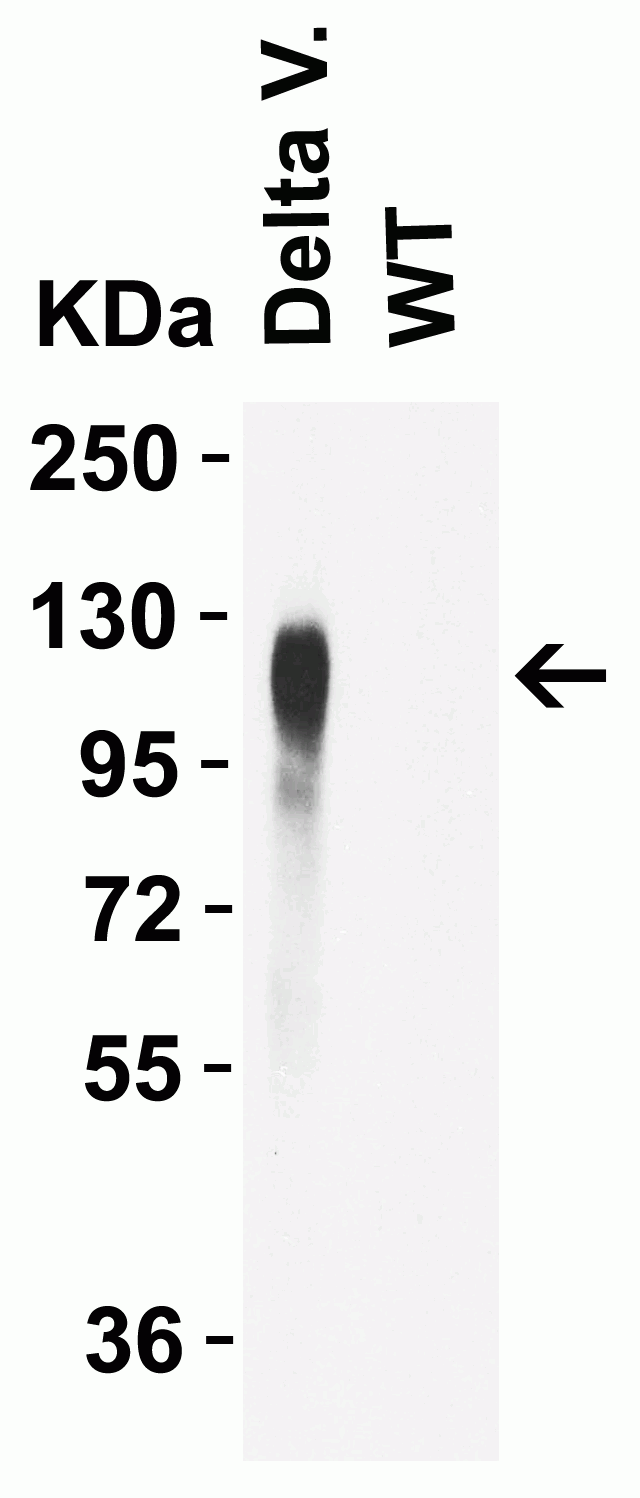SARS-CoV-2 (COVID-19) Spike L452R Antibody (Delta Variant)
Infectious Disease, COVID-19
- SPECIFICATION
- CITATIONS
- PROTOCOLS
- BACKGROUND

Application
| WB, E |
|---|---|
| Primary Accession | P0DTC2 |
| Other Accession | QHD43416 |
| Host | Rabbit |
| Clonality | Polyclonal |
| Isotype | IgG |
| Clone Names | S |
| Calculated MW | 141178 Da |
| Application Notes | WB: 1 μg/mL. Antibody validated: Western Blot in human samples. Anti-SARS-CoV-2 Spike L452R (Delta Variant) antibody specifically detects SARS-CoV-2 Delta Variant (B.1.617.2) Spike S1 protein, but not SARS-CoV-2 WT and other variant Spike S1 proteins by ELISA. All other applications and species not yet tested. |
| Gene ID | 43740568 |
|---|---|
| Alias Symbol | S |
| Other Names | SARS-CoV-2 Spike 156-157EF antibody: Severe acute respiratory syndrome coronavirus 2 (SARS-CoV-2), Surface Glycoprotein, Spike protein |
| Target/Specificity | It can only detect SARS-CoV-2 Delta Variant (B.1.617.2) Spike S1 protein and does not cross-react with the spike protein of other variants. |
| Reconstitution & Storage | SARS-CoV-2 Spike Delta Variant antibody can be stored at 4˚C for three months and -20˚C, stable for up to one year. As with all antibodies care should be taken to avoid repeated freeze thaw cycles. Antibodies should not be exposed to prolonged high temperatures. |
| Precautions | SARS-CoV-2 (COVID-19) Spike L452R Antibody (Delta Variant) is for research use only and not for use in diagnostic or therapeutic procedures. |
| Name | S {ECO:0000255|HAMAP-Rule:MF_04099} |
|---|---|
| Function | [Spike protein S1]: Attaches the virion to the cell membrane by interacting with host receptor, initiating the infection. The major receptor is host ACE2 (PubMed:32142651, PubMed:32155444, PubMed:33607086). When S2/S2' has been cleaved, binding to the receptor triggers direct fusion at the cell membrane (PubMed:34561887). When S2/S2' has not been cleaved, binding to the receptor results in internalization of the virus by endocytosis leading to fusion of the virion membrane with the host endosomal membrane (PubMed:32075877, PubMed:32221306). Alternatively, may use NRP1/NRP2 (PubMed:33082294, PubMed:33082293) and integrin as entry receptors (PubMed:35150743). The use of NRP1/NRP2 receptors may explain the tropism of the virus in human olfactory epithelial cells, which express these molecules at high levels but ACE2 at low levels (PubMed:33082293). The stalk domain of S contains three hinges, giving the head unexpected orientational freedom (PubMed:32817270). |
| Cellular Location | Virion membrane {ECO:0000255|HAMAP-Rule:MF_04099, ECO:0000269|PubMed:32979942}; Single-pass type I membrane protein {ECO:0000255|HAMAP-Rule:MF_04099, ECO:0000269|PubMed:34504087}. Host endoplasmic reticulum-Golgi intermediate compartment membrane {ECO:0000255|HAMAP-Rule:MF_04099, ECO:0000269|PubMed:34504087}; Single- pass type I membrane protein {ECO:0000255|HAMAP-Rule:MF_04099}. Host cell membrane {ECO:0000255|HAMAP-Rule:MF_04099, ECO:0000269|PubMed:34504087}; Single-pass type I membrane protein {ECO:0000255|HAMAP-Rule:MF_04099}. Note=Accumulates in the endoplasmic reticulum-Golgi intermediate compartment, where it participates in virus particle assembly. Some S oligomers are transported to the host plasma membrane, where they may mediate cell-cell fusion (PubMed:34504087). An average of 26 +/-15 S trimers are found randomly distributed at the surface of the virion (PubMed:32979942) {ECO:0000255|HAMAP-Rule:MF_04099, ECO:0000269|PubMed:32979942, ECO:0000269|PubMed:34504087} |

Thousands of laboratories across the world have published research that depended on the performance of antibodies from Abcepta to advance their research. Check out links to articles that cite our products in major peer-reviewed journals, organized by research category.
info@abcepta.com, and receive a free "I Love Antibodies" mug.
Provided below are standard protocols that you may find useful for product applications.
Background
SARS-CoV-2 delta variant, a variant of concern (VOC), known as B.1.617.2, was detected in India in October of 2020. However, it rapidly spread all over of the world and now it is the dominant variant in the world, which account for more than 99% of the cases. This variant carries at least 13 mutations in spike protein across the sub lineages, including L452R, D614G, P681R and K417N, which can increase the affinity to the human ACE2 receptor. Enhanced transmission of the Delta variant was observed globally, which is at least 2.5 times more contagious as the other variants. The Delta variant affects the effectiveness of COVID19 vaccine and is resistant to neutralization to some extent.
References
Zhang et al. JAMA 2021, 325 (13): 1324-26.
Reardon. Nature 2021.
Delphine. Nature 2021, 596 (7871): 276-280.
If you have used an Abcepta product and would like to share how it has performed, please click on the "Submit Review" button and provide the requested information. Our staff will examine and post your review and contact you if needed.
If you have any additional inquiries please email technical services at tech@abcepta.com.













 Foundational characteristics of cancer include proliferation, angiogenesis, migration, evasion of apoptosis, and cellular immortality. Find key markers for these cellular processes and antibodies to detect them.
Foundational characteristics of cancer include proliferation, angiogenesis, migration, evasion of apoptosis, and cellular immortality. Find key markers for these cellular processes and antibodies to detect them. The SUMOplot™ Analysis Program predicts and scores sumoylation sites in your protein. SUMOylation is a post-translational modification involved in various cellular processes, such as nuclear-cytosolic transport, transcriptional regulation, apoptosis, protein stability, response to stress, and progression through the cell cycle.
The SUMOplot™ Analysis Program predicts and scores sumoylation sites in your protein. SUMOylation is a post-translational modification involved in various cellular processes, such as nuclear-cytosolic transport, transcriptional regulation, apoptosis, protein stability, response to stress, and progression through the cell cycle. The Autophagy Receptor Motif Plotter predicts and scores autophagy receptor binding sites in your protein. Identifying proteins connected to this pathway is critical to understanding the role of autophagy in physiological as well as pathological processes such as development, differentiation, neurodegenerative diseases, stress, infection, and cancer.
The Autophagy Receptor Motif Plotter predicts and scores autophagy receptor binding sites in your protein. Identifying proteins connected to this pathway is critical to understanding the role of autophagy in physiological as well as pathological processes such as development, differentiation, neurodegenerative diseases, stress, infection, and cancer.



